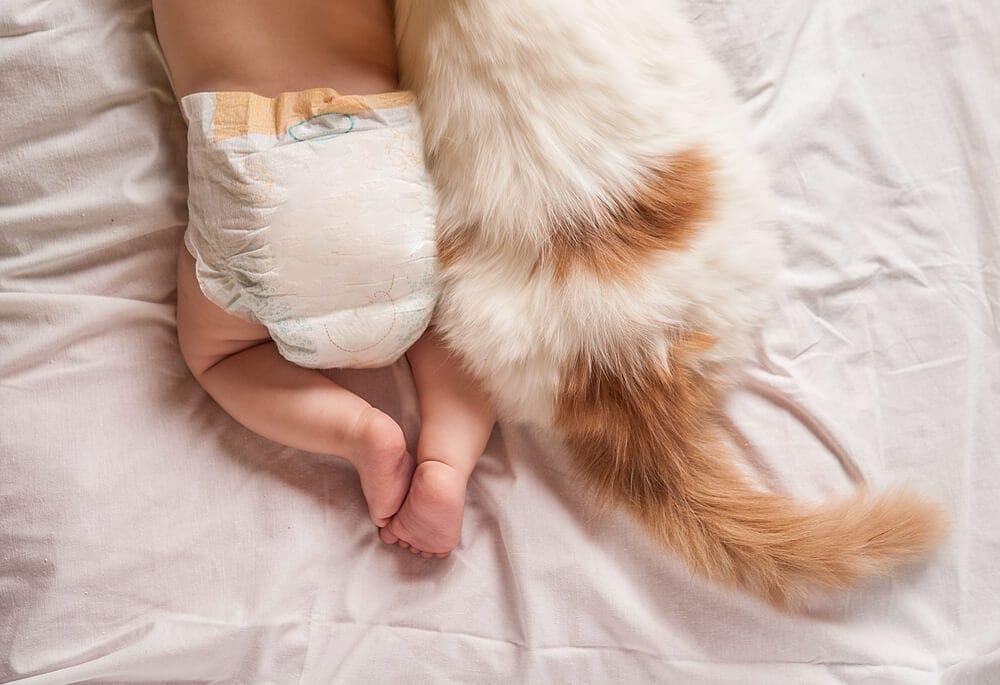
Cats and Newborn Babies
Looking forward to welcoming your first baby but you’re concerned about the rumours circulating about your friendly feline? Nadia Crighton catches up with veterinarian, Dr Lewis Kirkham, the author of Tell Your Cat You’re Pregnant. Together, they aim to abolish some myths and get to the facts about babies and cats.
It’s not uncommon to hear of sad stories of pet owners being told to give up their beloved felines when they are expecting their first baby. Not only is this a heartbreaking reality for many misinformed cat owners, it’s simply not necessary.
“The biggest misconception about cats and babies is that many people still say that you should not own a cat while you are pregnant,” Dr Kirkham says. “I have pregnant cat owners who quite regularly come to me, as a veterinarian and behaviourist, saying a well-meaning friend or relative has told them to get rid of their cat.”
Sometimes this advice can also come from their own general medical practitioner, with many professionals advising pregnant women to get rid of the family feline.
“This advice is outdated as we know that with simple precautions any risk of cats towards unborn babies is minimal,” Dr Kirkham says.
This is great news for cat owners who are expecting the pitter patter of human feet and any fear of contracting toxoplasmosis. The interesting fact is that you are more likely to contract toxoplasmosis from eating unwashed vegetables or under-cooked meat than from your furry friend. With some simple strict guidelines, you can greatly reduce the possibly of contracting this condition from your beloved cat, or the environment.
So how can you reduce the risks?
- Get someone else to clean the litter tray or use gloves
- Wash your hands thoroughly after handling litter
- Change litter daily
- Consider keeping your cat indoors
- Do not feed your cat raw meat
- Wear gloves when gardening
- Take steps to prevent cat’s toileting in your garden (cover sandpits etc)
Now we have abolished some myths, what about your cat? How do cats take to the introduction of a new baby in the home?
Most pet-parents do not consider the huge impact this will have on their pets, until after the baby arrives and trouble starts to appear. It’s all about getting prepared, before baby arrives.
“Preparing your cat for the arrival of your baby is very important,” Dr Kirkham advises. “Most cats do not like changes to their environment and a new baby is a huge change to the household.”
The hard-cold fact is that a new baby is a big adjustment for any household cat. Particularly for the first time. Remembering that your cat probably hasn’t had much experience with babies. Many owners assume that because the baby comes from them, their cat will just understand and everything will fall into place perfectly. This may be underestimating the impact it will have on your cat and inviting possible problems when bubs arrives home.
“The impact of a new baby on a cat can be huge,” Dr Kirkham warns. “New babies make a lot of different noises – not just crying – and all or any of the sounds can be upsetting for a cat. A new baby also means a lot of new furniture, smells and routine changes to the household which many cats find upsetting.”
Some symptoms of an unhappy cat include:
- Anxiety
- Reclusiveness
- Unwanted urination or spraying outside their litter
- Aggressiveness
“These are behaviours you do not want from your beloved cat,” Dr Kirkham says.
Dr Kirkham’s Top 5 Tips Before Bubs Comes Home:
- Start preparation as early as possible
- Educate yourself on toxoplasmosis and take suitable precautions
- Play a variety of baby sounds and toy noises to prepare your cat (included in the book)
- Make changes to the household slowly, allowing your cat time to adjust
- Set-up realistic routines of play, feeding and interaction times with your cat
Dr Kirkham’s Top 5 Tips After Bub Comes Home:
- Take the first introductions slowly – they have a lifetime to be best friends
- Make fun things happen for your cat whenever the baby is around
- Stick to your routines of play, feeding and interaction times with your cat
- Supervise all interactions between your cat and baby. Separate them when you are not able to provide active supervision.
- Address any behavioural problems or signs of anxiety earlier rather than later.
It is important to understand that if your cat does show signs of anxiety or behavioural issues, to tackle the problems early on. Seeking timely professional help markedly increases your chances of successful resolution. Do not wait, the longer the problem has been going on, the harder it may be to treat.
“Signs that your cat is struggling with the new baby can be wide ranging,” Dr Kirkham says. “The most common one is anxiety. This can be seen as continual hiding, escaping or running away; urinating or spraying outside the litter; not eating; hissing, growling and aggression.”
Dr Lewis Kirkham is a well-known and respected veterinarian with further qualifications in animal behaviour . The birth of his two daughters ignited a passion for educating expecting parents about the transition from child-free pet homes to a larger family. His hugely popular books, Tell Your Dog You Are Pregnant and Tell Your Cat You Are Pregnant have helped countless families successfully introduce baby’s and pets since 2005. For more information visit; www.babyandpet.com.au
Get the latest Pet Insider Tips & News
We offer award-winning* pet insurance policies to protect your furry friend’s health and wellbeing. Get a quote today and give your pets the care they deserve.
Archives
Categories
- Cat Care (65)
- Cats (2)
- Dog Care (129)
- Guides (29)
- Health and Nutrition (201)
- Lifestyle and Activities (221)
- Media Release (27)
- Pet Care (251)
- Rescue Dogs (1)

